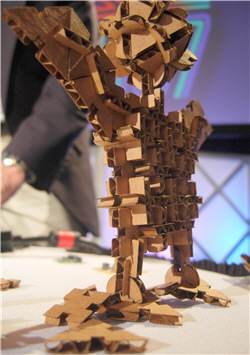SC07 Day 3: Programming bits and atoms


- Computers come in cases -> computers come in rolls, buckets
- Compilers optimize programs -> optimizations program compilers
- Bits are zero or one -> bits are between zero and one
- Internetworking -> interdevice interworking
- Programs can describe things -> programs can be things
One of Gershenfeld's interests is cheap digital fabrication. The cardboard man in the picture was fabricated by his daughter and actually inspired the PhD thesis of one of his students. The killer app for digital fabrication, he says, is personal fabrication - things you can't buy at Walmart. And what if, instead of sending energy, computation, etc. around the world, we sent the means to create it? He shared his experiences with doing just that in isolated and developing countries.
According to Gershenfeld, people want to measure and modify the world, not just visualize it. As regular objects become computerized and interconnected at a smaller and smaller scale, we're approaching the nano-scale of biological systems. We're "in the moment", he says, on the cusp of a fabrication revolution.
A computer is a tool and a program is a thing, says Gershenfeld. But during the Q&A, an audience member pointed out, "If programs are things then bugs are consequential." True, responded Gershenfeld, but we need not fear digital competition. "It's nothing new," he said. "Biological systems have been competing successfully for millions of years." We may be forward engineering how biology works, he says, but it's already working for us.